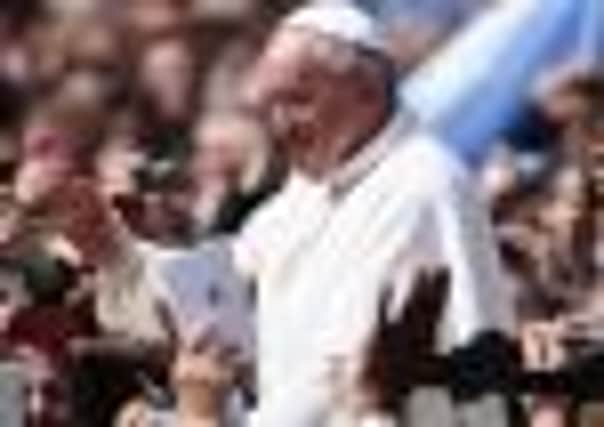Pope Francis Easter sermon a plea for peace


The Pope has repeatedly put concern for the poor and suffering at the centre of his messages, and he pursued his promotion of the causes of peace and social justice in the Easter speech delivered from the central balcony of St Peter’s Basilica, the same place from where he was introduced to the world as the first Latin American pontiff on 13 March.
He said he was joyfully aiming his Easter greetings, at “every house and every family, especially where the suffering is greatest, in hospitals, in prisons”. Pope Francis prayed that Jesus would inspire people to “change hatred into love, vengeance into forgiveness, war into peace”.
Advertisement
Hide AdAdvertisement
Hide AdAfter Mass, he stepped aboard an open-topped popemobile for a cheerful spin through the crowd, kissing babies and patting children on the head.
One onlooker, an admirer of both the Pope and of his favourite football team, Argentina’s Saints of San Lorenzo, insisted Francis take a team shirt he was waving. Francis obliged, briefly holding it up, and the crowd cheered.
In his softly and slowly pronounced speech, Pope Francis defined Easter as an “exodus, the passage of human beings from slavery to sin and evil to the freedom of love and goodness”.
As popes before him have, he urged Israelis and Palestinians to find the courage to resume peace talks and end a conflict that “has lasted all too long”. And, in reflecting on the Syrian crisis, he asked: “How much suffering must there still be before a political solution [can be found]?”
The Pope expressed a desire for a “spirit of reconciliation” on the Korean peninsula, where the North says it has entered “a state of war” with the South.
He also decried violence in Africa, where he singled out for condemnation terrorist hostage-taking, as well as strife in Mali and warfare in the Democratic Republic of Congo and in the Central African Republican.
The first pontiff to come from the Jesuits, an order with special concern for the poor, and the first to name himself after St Francis, a medieval figure who renounced wealth to preach the gospel, Pope Francis lamented that the world was “still divided by greed looking for easy gain, wounded by the selfishness that threats human life and the family, selfishness that continues in human trafficking, the most extensive form of slavery in this 21st century”.
Earlier, Francis celebrated Mass at an altar set up on the esplanade in front of the basilica.
Advertisement
Hide AdAdvertisement
Hide AdIn a departure from Easter tradition, the Pope will not be heading for a few days of relaxation at the Vatican’s summer palace in Castel Gandolfo, in the hills near Rome. That retreat is at present occupied by his predecessor, Pope Emeritus Benedict, who took up residence there in the last hours of his papacy on 28 February. Benedict XVI became the first pope in 600 years to resign, and will eventually live in a convent at the Vatican.
Pope Francis so far has declined to move into Benedict’s former apartment in the Apostlolic Palace, into the rooms whose studio overlooks St Peter’s Square. He is still in the Vatican hotel where he and fellow voting cardinals checked in on 12 March, the day before they chose him in a secret conclave.
While Pope Francis has just begun to make his mark on the Roman Catholic Church, he quickly made it plain he has little desire to embrace much of the pomp associated with the office. When he has appeared on the the basilica balcony, he has chosen to wear a simple white cassock, declining ornate outfits.